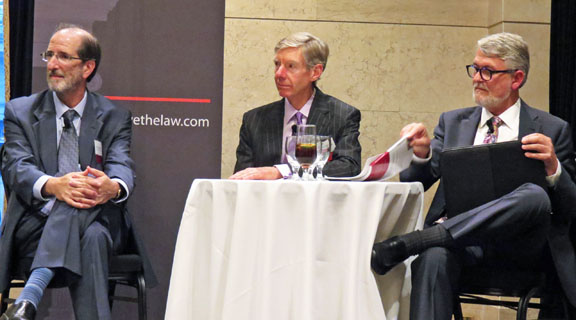Growth is dead: now what? It’s the title of Bruce MacEwen’s book and it was also the topic of a panel last night.

Because law firms are so disperse now — meaning there are some that are doing much better and those that are doing much worse versus general business health — MacEwen said law firms need to find a creative way to offer legal services.
“Strategy matters more than ever and differentiation matters more than ever,” he told the audience.
“The future will be owned by those who invent it, which means we all need to experiment,” he added.
MacEwen, a New York City lawyer and consultant to law firms on strategic and economic issues; Gary Luftspring, managing partner of Ricketts Harris LLP in Toronto; and R. Scott Jolliffe, chairman and CEO of Gowling Lafleur Henderson LLP in Toronto, participated in a discussion at Above The Law’s Toronto reception on The Future of Biglaw in Canada and the United States.
MacEwen said lawyers are finally accepting that the legal market is no longer growing at the rate it used to and finally starting to think about how to survive in the current “market-share battle.”
Jolliffe noted Canada has been slightly behind the curve and only now are lawyers beginning to see the same trends that have affected other legal markets, such as developments in technology and other forms of competition.
“In Canada, all of the major law firms are to some extent more or less downsizing, we’re all cutting costs wherever we can, to some extent we’ve learned how to price and bid for services maybe without really knowing how much they cost but we’re adopting techniques like project management to endeavour to monitor our costs,” said Jolliffe.
“But we have yet to get to a stage of real innovation, where we aren’t just waiting for the phone to ring and the client to ask but where we are in advance of that, creating that . . . and that’s the challenge we face.”
MacEwen said lawyers are way too assumptive about what clients want.
Luftspring, who is part of the Canadian Bar Association’s Legal Futures Initiative team, said the CBA has been conducting research and surveys to find out what clients want.
“For years and years and years, lawyers dictated the role that clients would play and who would be clients, and I think that’s outlawed,” he said.
Calling alternative fees “ludicrous,” Luftspring said nowadays clients are more concerned about how much value they can get from legal services so it’s important that lawyers have that conversation with clients at the outset.
“There’s tremendous opportunity if you get in tune with your client and have an early discussion about what the client actually values,” he said.

 Because law firms are so disperse now — meaning there are some that are doing much better and those that are doing much worse versus general business health — MacEwen said law firms need to find a creative way to offer legal services.
Because law firms are so disperse now — meaning there are some that are doing much better and those that are doing much worse versus general business health — MacEwen said law firms need to find a creative way to offer legal services.